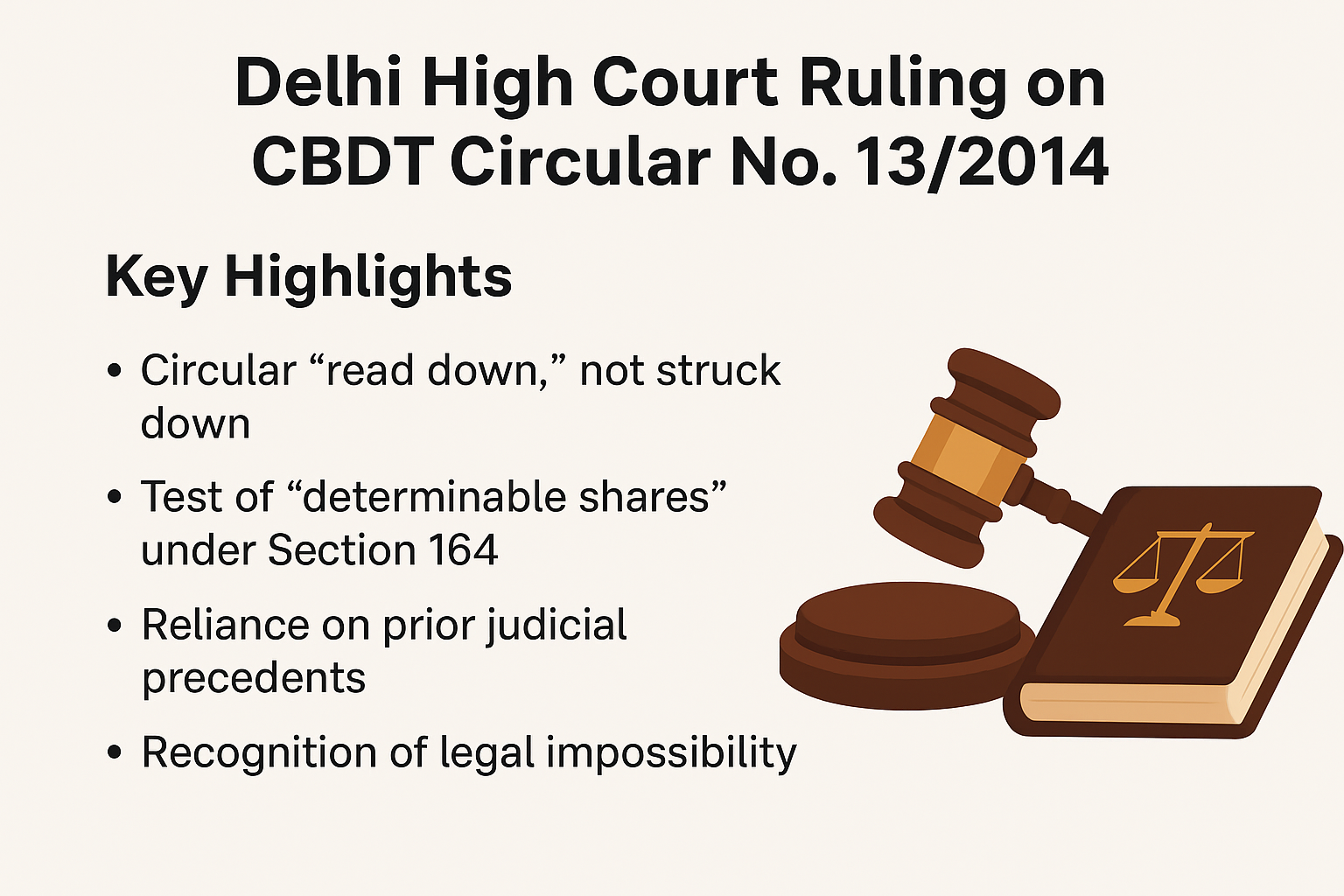View News
Relief for AIFs and Investors

Delhi High Court’s Landmark Ruling on CBDT Circular No. 13/2014: Relief for AIFs and Investors
The Delhi High Court has recently delivered a significant judgment on the applicability of CBDT Circular No. 13/2014in the context of Alternative Investment Funds (AIFs). The ruling provides much-needed clarity on the taxation of private trust structures and addresses the long-standing conflict between tax law requirements and SEBI regulations.
Background
CBDT Circular No. 13/2014 had created considerable uncertainty in the taxation of Category III AIFs by mandating the application of Maximum Marginal Rate (MMR) where the beneficiaries’ names and their exact shares were not specifically recorded in the trust deed.
Industry stakeholders argued that such a requirement was impractical because SEBI Regulations prohibit AIFs from accepting investments or identifying investors before obtaining registration. This resulted in a legal paradox: compliance with SEBI law led to automatic non-compliance with the CBDT Circular.
Key Highlights of the Delhi High Court Ruling
1. Circular “Read Down,” Not Struck Down
The Court did not strike down Circular No. 13/2014 but read it down—limiting its scope to align with the provisions of the Income-tax Act, 1961.
2. Test of “Determinable Shares” under Section 164
The Court emphasised that the real test is whether the shares of beneficiaries are determinable, not whether their names are specifically written in the original trust deed.
-
If the shares are ascertainable based on contribution agreements or subsequent documentation, normal tax rates apply.
-
Merely because beneficiaries are not listed in the trust deed does not make it an indeterminate trust.
3. Reliance on Prior Judicial Precedents
The judgment reaffirmed principles established in:
-
CIT v. India Advantage Fund-VII (Karnataka HC)
-
CIT v. TVS Shriram Growth Fund (Madras HC)
Both rulings held that determinable shares attract regular tax rates, not MMR. The Supreme Court had also dismissed the SLP against the Madras HC ruling, strengthening its binding value.
4. Recognition of Legal Impossibility
Invoking the principle of lex non cogit ad impossibilia (“the law does not compel the doing of impossibilities”), the Court held:
-
Under SEBI (AIF) Regulations, 2012 (Regulations 3(1) and 6(3)) and Section 12 of SEBI Act, 1992, an AIF cannot accept investments or name beneficiaries in the trust deed before registration.
-
Therefore, Circular No. 13/2014 created a legal impossibility, unfairly penalising Category III AIFs.
5. Strong Criticism of CBDT Circular’s Jurisdictional Disclaimer
The Court condemned the Circular’s statement that it would not apply in jurisdictions where High Courts had taken a contrary view.
-
This was described as “abhorrent and baffling.”
-
The Court reiterated that once a Constitutional Court settles a legal principle, it applies across India, not just in one state.
Implications of the Ruling
-
Pro-Investor and Industry-Friendly: The decision ensures that Category III AIFs with determinable shares are not unfairly subjected to punitive taxation.
-
Clarity on Trust Taxation: The Court has harmonised SEBI regulations with tax law by giving precedence to substance over form.
-
Check on Tax Department Overreach: The ruling prevents the tax authorities from issuing circulars that exclude the applicability of binding High Court precedents.
-
Future Litigation Impact: This judgment will serve as an important precedent in cases where regulatory conflicts create compliance impossibilities.
Conclusion
The Delhi High Court’s ruling on CBDT Circular No. 13/2014 is a landmark development in tax jurisprudence. By reading down the Circular, the Court has struck a balance between SEBI regulations and income-tax law, ensuring fairness for AIFs and investors.
This judgment provides long-awaited certainty to the taxation of private trust structures and reinforces judicial principles against arbitrary administrative overreach. For the alternative investment industry, it is a decisive step toward regulatory harmony and investor confidence.
At Legalmantra, we believe this ruling marks a turning point in the treatment of AIFs under Indian tax law—ushering in an era of clarity, consistency, and investor protection

